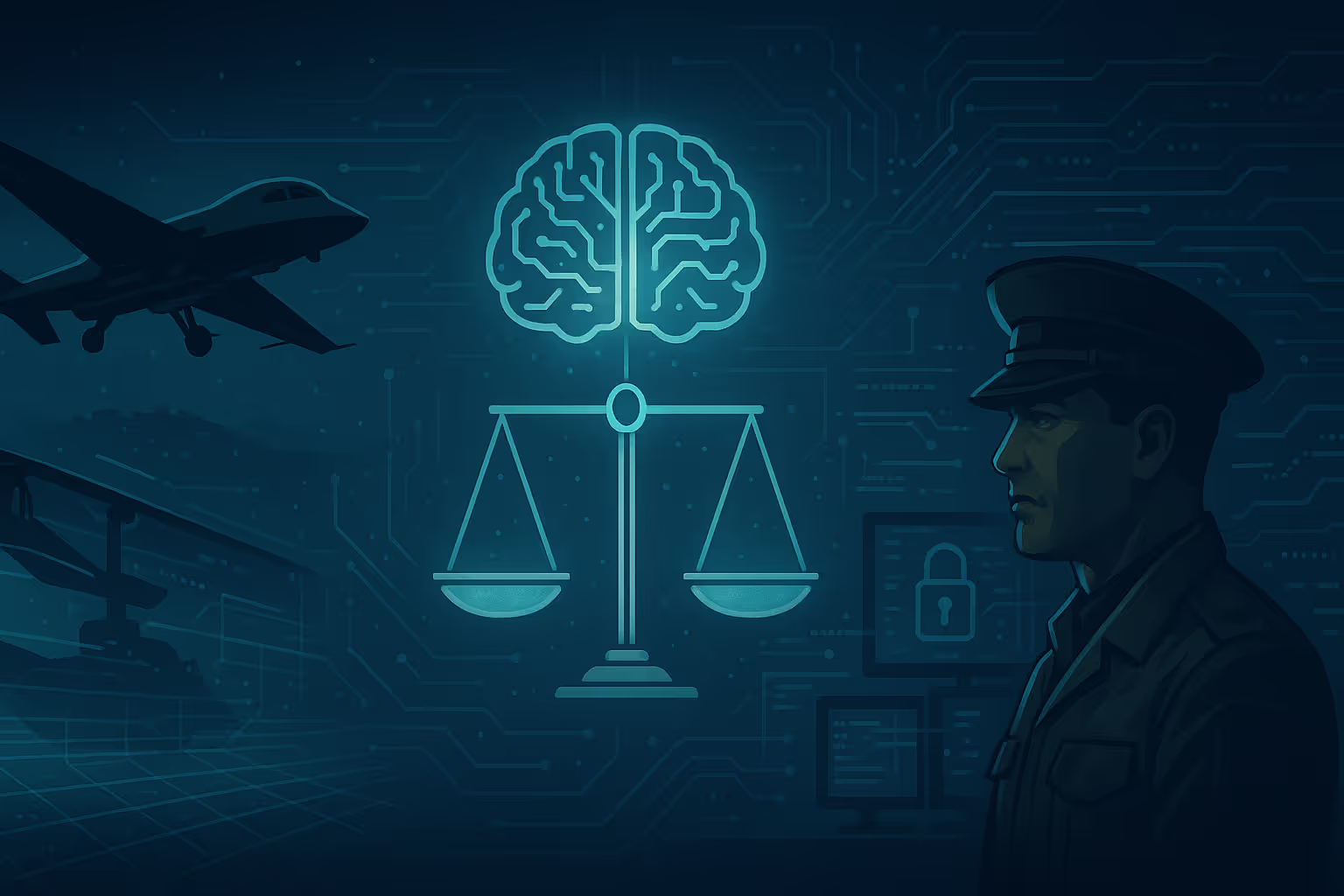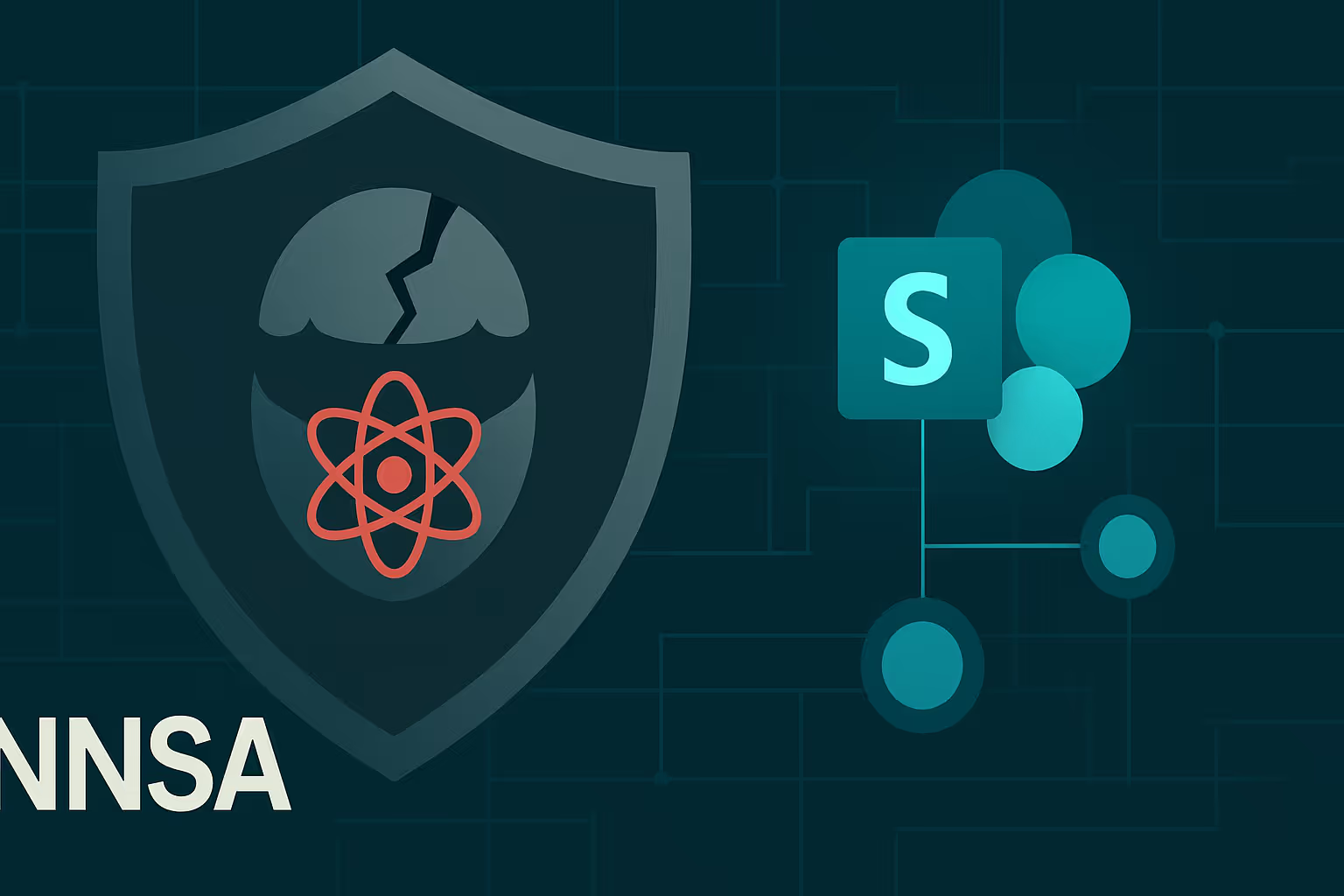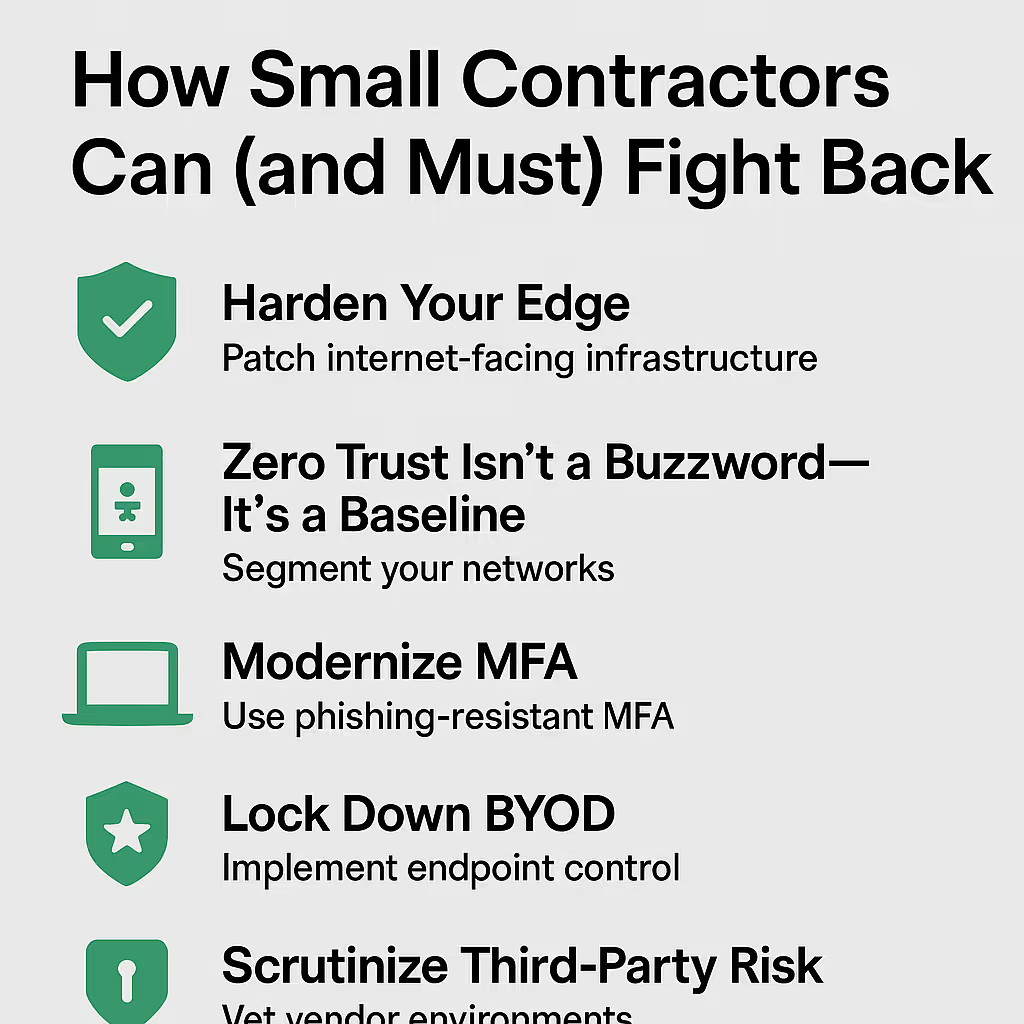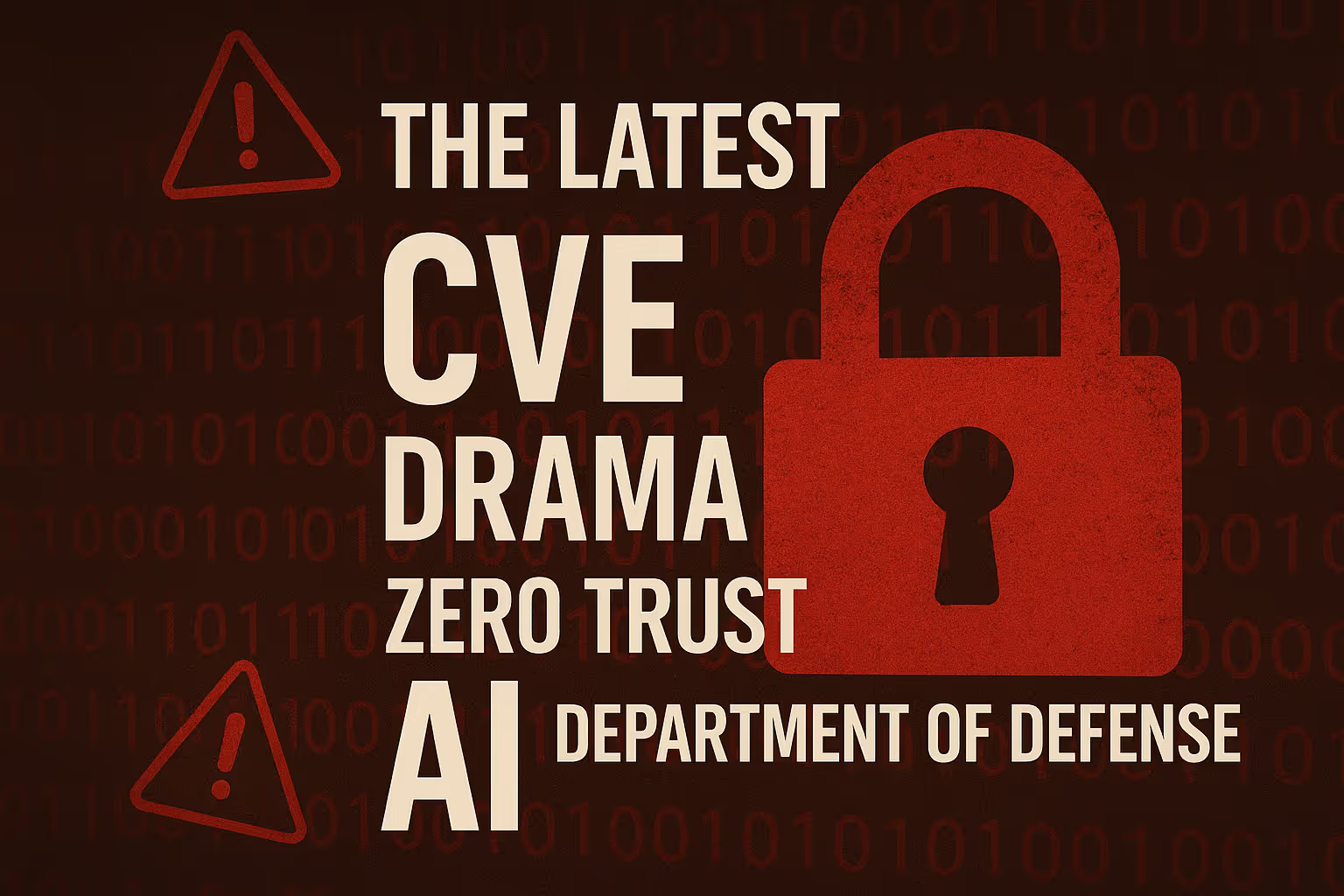AI in the Defense Sector: Balancing Innovation with Operational Risk

.avif)
Artificial intelligence is transforming the defense sector, bringing unprecedented opportunities alongside new challenges. Military organizations see AI as a game-changer that can “improve efficiency, accuracy, and strategic decision-making across operations” (Cohen 2023). At the same time, defense leaders recognize that adopting AI comes with operational risks, from technical uncertainties to ethical dilemmas. Achieving the right balance between innovation and risk is now a top priority in national security circles.
The Promise of AI in Defense
AI-driven technologies are increasingly integral to the modern battlefield. Autonomous systems like unmanned aerial vehicles leverage AI to execute complex missions in hazardous environments, reducing risk to human personnel. Advanced algorithms can also sift through intelligence data or monitor networks at speeds impossible for human analysts, underscoring the broad impact of AI across defense operations. From headquarters to the frontline, AI is being applied in numerous areas of defense. Key high-level applications include:
- Decision Support & Intelligence Analysis: AI helps military decision-makers make sense of massive data flows. Intelligent systems can process surveillance feeds, sensor data, and intelligence reports to provide a comprehensive, near real-time picture of the battlefield (Cohen 2023). By identifying patterns and anomalies that humans might miss, AI-driven analytics enhance situational awareness and support faster, more informed decisions.
- Cybersecurity & Threat Detection: In the cyber domain, AI has become indispensable for defense. Machine learning models can detect and respond to network intrusions or malware than traditional tools, often in real time (Cohen 2023). AI-based cyber defenses learn from each attack, improving their capabilities continuously.
- Autonomous Systems & Robotics: The development of autonomous vehicles, drones, and robotic systems is a major defense trend. These AI-enabled platforms take on dangerous or high-stakes tasks with minimal human intervention. They can navigate complex or hostile terrains and carry out missions that would be dull, dirty, or dangerous for troops.
- Training Simulation & Readiness: AI enhances how defense organizations train and prepare. AI-powered simulations and wargaming environments can replicate a wide range of battlefield scenarios with high realism (Cohen 2023). For example, virtual reality training systems driven by AI allow pilots, soldiers, and cyber analysts to practice missions in synthetic environments that adapt to their actions. These intelligent simulators provide diverse training experiences that improve readiness.
The defense community understands that embracing innovation in areas like decision support, cybersecurity, and autonomy is not optional; it’s essential to maintain a competitive edge. Yet with this promise comes a responsibility to deploy AI thoughtfully and safely.
Operational Risks and Challenges
Every new technology in defense introduces risks, and AI is no exception. The operational risks of AI range from technical failures to unintended consequences in the fog of war. A poorly designed or misused AI system could make a wrong recommendation or identification, with serious real-world repercussions. If an AI’s decision-making is not aligned with human intent and ethical norms, it could produce unintended outcomes. These possibilities underscore why militaries approach AI with cautious optimism: the goal is to leverage AI’s power without undermining safety or losing control.
Reliability and testing are paramount. Defense AI systems must be rigorously evaluated to ensure they work as expected under battlefield conditions. Unlike consumer tech, there is little margin for error when lives and national security are at stake. AI algorithms are complex, developers and operators need tools to verify recommendations and trace the model’s reasoning. This is leading to greater emphasis on transparency and explainability in military AI tools. Commanders should be able to trust an AI assistant but also have insight into its rationale.
Another major concern is overreliance on AI at the expense of human skills and judgment. If personnel come to uncritically accept AI outputs or let automated systems take over too many tasks, human expertise can erode over time. AI is introduced as an aid, not a replacement. Commanders emphasize that AI should augment human decision-making, not override it. Regular training and skills refreshment for warfighters ensure that humans remain fully prepared to step in and override if needed.
Ethical considerations and values play a guiding role in mitigating AI risks. The Department of Defense has adopted formal AI Ethics Principles to steer development and use of AI in line with core values. These principles require that military AI systems be Responsible, Equitable, Traceable, Reliable, and Governable. Air Force Lt. Gen. Jack Shanahan (the former director of the Joint Artificial Intelligence Center) says, “whether it does so in a positive or negative way depends on our approach to adoption and use” (Lopez 2020). Adopting AI in a manner that reflects our nation’s legal and ethical standards is fundamental to maintaining trust within the ranks and with the public. In practice, this means keeping humans in control of any lethal force decisions and thoroughly reviewing AI systems for unintended bias or violations of ethical norms before they are fielded.
Finally, planners must anticipate adversaries who will actively deceive or sabotage AI systems. Just as AI can strengthen cybersecurity, it can also be targeted by novel cyber-attacks (like feeding an AI false data to mislead it). Defense analysts are researching how to make AI robust against manipulation and how to detect when an AI system may be tricked or behaving abnormally. This is part of the broader risk calculus: staying ahead of adversaries in the AI realm while ensuring our own tools don’t become liabilities.
The Role of Industry and Responsible Partnerships
The complexity of defense AI means the Pentagon cannot go alone. A significant portion of AI innovation comes from the private sector, so partnerships between the defense community and industry are crucial. Companies working in AI and cybersecurity provide expertise in cutting-edge algorithms, cloud computing, and data analytics that the military can leverage. However, with this opportunity comes a shared responsibility that industry partners must build AI solutions with security and ethics.
Responsible industry partnership entails close collaboration and clear communication of requirements. Defense agencies are increasingly communicating their ethical guidelines to contractors to ensure everyone is on the same page. For example, the Defense Innovation Unit has published Responsible AI Guidelines to operationalize the Pentagon’s AI principles in commercial prototyping efforts. These guidelines help AI companies and defense program managers by embedding fairness, accountability, and transparency into the AI development lifecycle. By following such frameworks, industry partners help increase confidence that the AI solutions they provide are trustworthy and aligned with U.S. values.
Open dialogue and joint oversight are also key. The best outcomes arise when defense end-users work together with AI developers. Through exercises, pilot programs, and iterative feedback, companies can tune their AI tools to real-world military conditions. This collaborative approach ensures that AI deployments address actual mission needs and that potential problems are caught early. It also builds trust with military personnel who are more likely to use AI systems that have a role in shaping and understanding. Ultimately, strong public-private partnerships accelerate innovation safely, allowing the defense sector to advance AI capabilities faster while keeping risk in check.
Conclusion
AI’s rise in the defense sector is both exciting and sobering. It offers the promise of smarter, faster decisions and game-changing capabilities, but it also demands vigilance, foresight, and prudence in implementation. By staying at the cutting edge of AI research and adhering to principles of responsibility and human oversight, the defense community can innovate without compromising on ethics or security. Adapt Forward and similar organizations recognize that success with military AI isn’t just about pushing technology; it’s about ensuring technology serves our strategic objectives safely and reliably. In balancing innovation with operational risk, the goal is to unlock AI’s tremendous potential for national security while firmly upholding the values and trust that underpin the defense enterprise.
References
Cohen, C. J. (2023, July 25). AI in defense: Navigating concerns, seizing opportunities. National Defense Magazine. https://www.nationaldefensemagazine.org/articles/2023/7/25/defense-department-needs-a-data-centric-digital-security-organization nationaldefensemagazine.org.
Lopez, C. T. (2020, March 11). DOD adopts 5 principles of artificial intelligence ethics. U.S. Army. https://www.army.mil/article/233690/dod_adopts_5_principles_of_artificial_intelligence_ethics.
.avif)
.avif)
RELATED POSTS

Adapt Forward Selected for Missile Defense Agency’s SHIELD Contract to Support Nation’s Golden Dome Initiative
Adapt Forward, a veteran-owned cybersecurity firm supporting the Department of Defense (DOD) and other federal agencies, has been selected by the Missile Defense Agency (MDA) to compete for task orders under the Scalable Homeland Innovative Enterprise Layered Defense (SHIELD) contract.

Mike Small Returns to Adapt Forward
Micheal Small as attack sensing and warning (AS&W) technical lead. A retired Army veteran and accomplished cyber professional, Small brings more than two decades of experience leading offensive and defensive operations across military, intelligence, and commercial cyber domains.

Lessons from the Nuclear Weapons Agency Breach
Lessons learned from the Toolshed Nuclear Weapons Agency Breach

Adapt Forward Selected for Missile Defense Agency’s SHIELD Contract to Support Nation’s Golden Dome Initiative
Adapt Forward, a veteran-owned cybersecurity firm supporting the Department of Defense (DOD) and other federal agencies, has been selected by the Missile Defense Agency (MDA) to compete for task orders under the Scalable Homeland Innovative Enterprise Layered Defense (SHIELD) contract.

Mike Small Returns to Adapt Forward
Micheal Small as attack sensing and warning (AS&W) technical lead. A retired Army veteran and accomplished cyber professional, Small brings more than two decades of experience leading offensive and defensive operations across military, intelligence, and commercial cyber domains.

Lessons from the Nuclear Weapons Agency Breach
Lessons learned from the Toolshed Nuclear Weapons Agency Breach

Employee Spotlight: Joe Fulco Wins NCMS Society Award – Again!
Employee Spotlight: Joe Fulco has once again been honored with the prestigious NCMS Society Award, recognizing his outstanding contributions to the field of National Industrial Security.

What is Model Context Protocol?
What is Model Context Protocol? What are the Benefits? What are the Risks?
An educational piece that educates on Model Context Protocol and what it means for the DoD

The 2025 DBIR Is Clear: Small Defense Contractors Are the New Primary Target
Verizon 2025 DBIR and what it means for Small Defense Contractors
In the world of cybersecurity, perception lags behind reality. Many small and mid-sized defense contractors still believe they fly under the radar. The 2025 Verizon Data Breach Investigations Report (DBIR) puts that myth to rest.

What Happens When CVE Goes Dark?
The Hidden Threat to DoD Cyber Strategy, Zero Trust, and AI Modernization
In this thought leadership piece, Adapt Forward addresses the urgent need to modernize our national vulnerability intelligence infrastructure. The near-shutdown of the CVE program exposed a systemic fragility in the foundation of Zero Trust, AI-driven defense platforms, and CTEM pipelines. While CVE has served as a critical baseline for decades, it’s no longer sufficient in a world where adversaries move at machine speed. This article breaks down why CVE can’t be sunset overnight—but must evolve into a risk-aware, threat-informed, AI-compatible system. We outline the future: predictive scoring, contextual enrichment, and mission-driven collaboration across public and private sectors.

Hire Vets Gold Award
Adapt Forward Earns 2024 HIRE Vets Gold Medallion Award – For the Second Year in a Row
We are proud to announce that Adapt Forward has once again been awarded the HIRE Vets Gold Medallion by the U.S. Department of Labor—marking our second consecutive year receiving this prestigious national honor.

James Cogswell Award
Adapt Forward Receives 2024 James S.Cogswell Award for Outstanding Industrial Security Achievement
We’re proud to announce that Adapt Forward has been selected as a 2024 recipient of the James S. Cogswell Outstanding Industrial Security Achievement Award by the Defense Counter Intelligence and Security Agency (DCSA).

Inc 5000
Adapt Forward Named to the 2020 Inc. 5000 List of America’s Fastest-Growing Companies
We’re thrilled to announce that Adapt Forward has been ranked #542 on the 2020 Inc. 5000 list, the most prestigious ranking of the nation’s fastest-growing private companies!









.avif)